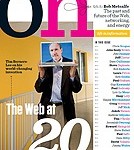Jan28
Preparing for the Unknown
Point: You may not be able to predict the future, but you can prepare for it by tracking early trends and staying open to disruptions.
Story: What will the web look like in 20 years? Stuart Miniman of the Office of the CTO at EMC Corporation asked me to contribute my thoughts on this, as part of EMC’s ON magazine celebration of the web’s 20th anniversary.
My predictions for 2030? I know that I don’t know, but I do follow some heuristics that are helpful regardless of which future materializes.
“You can’t predict the future,” said Google’s Eric Schmidt back in 1993 when he was president of Sun Technology Enterprises (a subsidiary of Sun Microsystems). “But you can estimate it. Your estimations are based on understanding the model of technology.” Schmidt’s mental model of technology involves looking at underlying drivers and expecting innovation from anywhere. “Don’t think your company is the best and will be the first to come with an innovation in your area. That attitude will lead you to become blindsided.”
With that in mind, here are two trends I’ll be watching closely for emerging innovations:
* Geo-Spatial Data and Semantic Smarts
Consider these facts by Jeff Jonas, IBM Distinguished Engineer and Chief Scientist, Entity Analytic Solutions, IBM Software Group:
Mobile devices in America are generating something like 600 billion geo-spatially tagged transactions per day. Every call, text message, email and data transfer handled by your mobile device creates a transaction with your space-time coordinate, whether you have GPS or not. Every few minutes, it sends a heartbeat, creating a transaction whether you are using the phone or not.
The implications? Companies can use data analytics to learn unprecedented amounts of information on their customers (how far they travel, locations where they hang out, the people they hang out with). It may sound like big brother, but some consumers are already turning this into a big game and social lifestyle with the help of companies like Foursquare, Loopt, Brightkite, etc. There’ll be opportunities for companies to use this data combined with web-based data to serve their customers better.
With every device and service gathering more and more data and becoming more connected, systems will begin to “understand” the meaning of the data to give people what they want. I don’t know if real AI will ever happen, but with all the available data, social tools, and clever people building clever companies, it seems that devices are going to act like they know the meaning behind the data and and take or suggestion actions to help you. For example, if your cellphone knows your calendar’s next appointment, your location, and gets the Tweets about the traffic jam on the highway, it can alert you to leave a little earlier or alert whomever you’re meeting that you’ll be late.
* Social/Distributed Decision-Making
Knowledge-intensive tasks such new product and service development will be aided by enterprise-wide collaboration systems with built-in voting, reputation systems, and predictive markets. These concepts were envisioned by MIT Prof. Thomas W. Malone before the Web as we know it even existed. His publications, such as Computers, Networks and the Corporation, describe the organizational changes that networked computers would bring.
Tom Malone now heads the Center for Collective Intelligence at MIT. The center’s basic research question is: How can people and computers be connected so that—collectively—they act more intelligently than any individuals, groups, or computers have ever done before?
I think one of the most powerful uses of the web in the future is for crowdsourcing and open innovation to tackle some of the world’s biggest problems. Take, for example, that Innocentive just announced a GlobalGiveback Innovation Challenge Set to help solve some of the world’s water problems through open innovation. Other crowdsourcing platforms like ideas4all.com are enabling entrepreneurs to suggest product, service and business ideas to win funding. The web will enable collaboration on a global scale that will let us marshal our creative energies to tackle global issues.
What do you think?
And, yes, whatever the future brings, there’ll be an app for that.
Action
- Look for things that are becoming ubiquitous but aren’t being used as much as they could be.
- Avoid self-centered attitudes about the future. Just because you don’t want to be tracked doesn’t mean others don’t want to be tracked or that someone won’t create a fun and rewarding reason to change your mind about tracking.
- Look for chocolate+peanut-butter combinations like geo-spatial data + semantics.
- Test out some crowdsourcing platforms (ideas4all.com is public and ongoing) to get a feel for how they work. Consider how you could apply them.
Sources:
EMC’s ON magazine: The Web at Twenty
Jeff Jonas: Your Movements Speak for Themselves
Eric Schmidt at the University of Colorado-Boulder, February 9, 1993
9 Comments »How-to, open innovation, Social Media
9 Responses to “Preparing for the Unknown”










Robyn McMaster Jan 28th 2010 at 10:22 am 1
Andrea, you’ve got my brain buzzing with your thoughts. So many new tools come on the scene yearly that it’s hard to imagine the possibilities. It’s great to see your thinking.
Andrea Meyer Jan 28th 2010 at 10:50 am 2
Thanks, Robyn. Thinking about the future and imagining practical applications is lots of fun – as I know you know from the various brain exercises you recommend!
Mike Jan 29th 2010 at 09:03 am 3
Very interesting, Andrea. I like, “You can’t predict the future, but you can estimate it.” Reminds me of the “How to Measure Anything” philosophy that says it’s all about reducing uncertainty rather than trying to eliminate it.
But I digress. I think you’re spot on with geo-spatial data and semantic smarts. The potential overlap with augmented reality apps will be very cool to watch, as well.
On the distributed decision-making, I think there are both, say, “cultural” and rational barriers to this becoming very ubiquitous. On the one hand, we still place a lot of emphasis on expert intuition, sometimes justifiably, and I don’t see that greatly changing. On the other hand, it can be hard to re-create the conditions of diversity, independence, and decentralization needed for crowds to be wise.
Andrea Meyer Jan 29th 2010 at 10:23 am 4
Thanks, Mike. Great point about the potential overlap with augmented reality apps, that is a very interesting space to watch.
To your point about distributed decision-making, I agree that there are many hurdles to be overcome for that to become a reality. The drivers that may encourage movement in that direction include the growing complexity of problems and greater interconnections between supply chain partners (such as suppliers or lead customers helping a company to innovate). Another driver is the integration of voting mechanisms and reputation scores into enterprise-wide collaboration tools like Spigit’s. What excites me most about this is the potential for people to self-select and contribute ideas. (By self-select, I mean that they participate in idea generation, building & evaluation without being specifically asked to do so.) The potential is to draw upon a wider base of knowledge than just the “usual” corporate team and the people they know. That would be advantageous, I think. In any case, I’ll be watching these trends to see what the future brings!
Gail Storey Feb 5th 2010 at 02:32 pm 5
Andrea, your excellent post gives new meaning to the notion that “flexibility is a sign of mental health.” I forget who said that, but it seems to obtain more and more in our innovative world.
Prince Mar 7th 2010 at 12:35 pm 6
Andrea – I seldom have nothing to say (well, almost nothing). This happens to be one of them. Excellent read 🙂
I will venture to add that by 2030, there will be numerous “individual” corporations and brands – all enabled and empowered by real time, location-intelligent, mobile, and crowd-sourced platforms.
Cheers,
Prince
Andrea Meyer Mar 10th 2010 at 08:58 am 7
Thanks, Prince, I think you’re right on the money with your prediction – and hopefully it will happen sooner!
Some very special readings this week « Intuinovare Apr 3rd 2010 at 11:48 am 8
[…] Preparing for the Unknown by Andrea Meyer […]
Rick Ross Apr 17th 2010 at 03:15 pm 9
While this post is interesting and thought-provoking, the topic selection is brilliant. Instead of, as you suggest, preparing for the future, too many avoid giving what can’t be accurately known meaningful consideration.